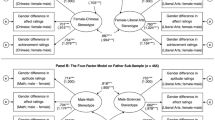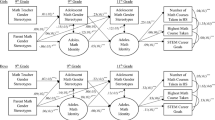Abstract
This study is an attempt to determine whether (a) the gender of a young child would elicit differential academic beliefs from individuals who aspire to become parents and teachers; and (b) male and female individuals who aspire to become parents and teachers have differential academic beliefs about young children. Data from 108 university students who intended to become parents and teachers showed that the gender of a young child elicited differential academic beliefs, and that male and female aspiring parents and teachers tended to have different academic beliefs about young children. The findings are discussed in terms of the relationship between stereotyped socialization practices and differential achievement between the two genders. Implications of the findings for education are noted.
Similar content being viewed by others
References
Broverman, I. K., Broverman, D. M., Clarkson, F. E., Rosenkrantz, P. S., & Vogel, S. R. (1970). Sex-role stereotypes and clinical judgments of mental health. Journal of Consulting and Clinical Psychology, 34, 1–7.
Crandall, V. C. (1969). Sex differences in expectancy of intellectual and academic reinforcement. In C. P. Smith (Ed.), Achievement-related behaviors in children. New York: Russell Sage.
Entwisle, D. R., & Baker, D. P. (1983). Gender and young children's expectations for performance in arithmetic. Developmental Psychology, 19, 200–209.
Hess, R. D. (1981). Approaches to the measurement and interpretation of parent-child interaction. In R. W. Henderson (Ed.), Parent-child interaction, theory, research and prospects. New York: Academic Press.
Hess, R. D., & Holloway, S. D. (1984). Family and school as educational institutions. In R. D. Parke (Ed.), Review of Child Development Research, pp. 179–222.
Marcus, T. L., & Ccrsini, D. A. (1978). Parental expectations of preschool children as related to child gender and socioeconomic status. Child Development, 49, 243–246.
Parsons, J. E., Adler, T. F., & Kaczala, C. M. (1982). Socialization of achievement attitudes and beliefs: Parental influences. Child Development, 53, 310–321.
Rodman, H., & Voydanoff, P. (1978). Social class and parents' range of aspirations for their children. Social Problems, 25, 333–344.
Rodman, H., & Voydanoff, P. (1978). Social class and parents' range of aspirations for their children. Social Problems, 25, 333–344.
Rosen, B., & D'Andrade, R. (1959). The psychosocial origins of achievement motivation. Sociometry, 22, 185–218.
Scott-Jones, D. (1984). Family influences on cognitive development and school achievement. In E. W. Gordon (Ed.), Review of Research in Education, Vol. 11, pp. 259–304.
Seginer, R. (1983). Parent's educational expectations and children's academic achievements: A literature review. Merrill-Palmer Quarterly, 29, 1–23.
Winterbottom, M. R. (1958). The relation of need for achievement to learning experiences in independence and mastery. In J. W. Atkinson (Ed.), Motives in fantasy, action, and society. Princeton, NJ: Van Nostrand.
Author information
Authors and Affiliations
Rights and permissions
About this article
Cite this article
Leung, J.J. Aspiring parents' and teachers' academic beliefs about young children. Sex Roles 23, 83–90 (1990). https://doi.org/10.1007/BF00289881
Issue Date:
DOI: https://doi.org/10.1007/BF00289881




